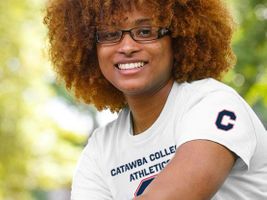
On Sunday, March 28, 2010 at 7:00 p.m., the combined choirs of Catawba College will perform George Frederick Handel's Messiah at Omwake Dearborn Chapel on the Catawba campus. The Catawba Singers, Catawba Chorale, Catawba Chamber Singers, and the vocal faculty of the College have worked since September to prepare this concert of Handel's revered oratorio. A Baroque chamber orchestra composed of musicians from the Charlotte symphony will accompany the singers.
"Handel's Messiah was really written for the Lenten season," says director Paul Oakley. "Messiah as a Christmas piece is purely an American idea."
Oakley should know. Over the span of his career, he has directed the piece more than one hundred times. His involvement began at the age of 13 when he played the piano accompaniment for a performance at his school. During his years in Minnesota, Oakley directed the Bach Society, a professional choir that performed Messiah for a two-week run every year at Christmas.
"I've directed everything from large choirs with full orchestras, to a group of 24 singers with a small group of musicians playing authentic Baroque instruments," he says. Oakley has led performances of Handel's Messiah in 10 different states, as well as at Carnegie Hall in New York.
Soloists for this performance are four of Catawba's highly acclaimed vocal faculty, including soprano Christina Pier, mezzo-soprano Martha Bartz, tenor Todd Geer, and baritone Scott McCloud. Catawba adjunct faculty member Dennis Jewett has assisted Oakley in preparing the choirs.
Messiah was first performed in Dublin on April 13, 1742 as a benefit concert for a local foundling hospital. "It was written for the Lenten season," Oakley explains, "because operas were forbidden during Lent, and Handel was very adept at finding ways to earn money from his compositions. In fact, he was the first composer actually to sustain himself from ticket sales and royalties, without being dependent on a patron. If Bach was the Stravinsky of that period," Oakley adds, "then Handel was the Andrew Lloyd Webber."
Tickets for Catawba's concert at 7:00 p.m. on Palm Sunday, March 28, are available at the door for a suggested donation of $10 for adults and $5 for students.
RELATED CONTENT:
